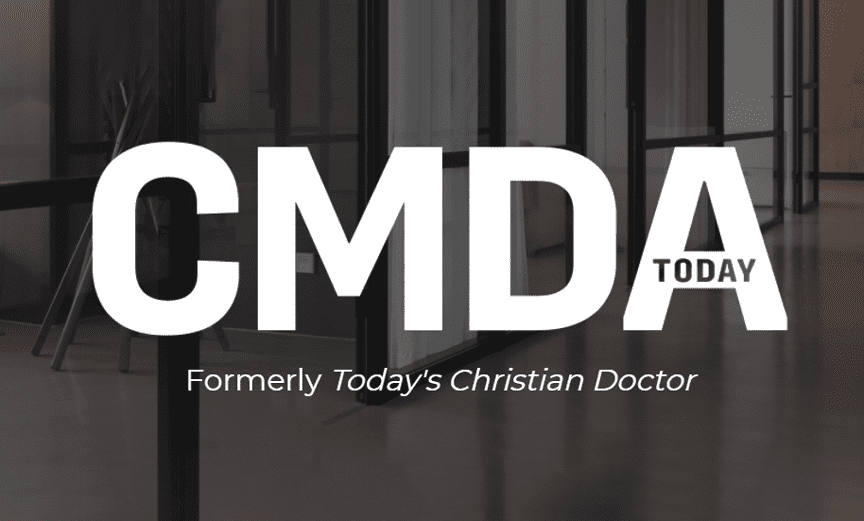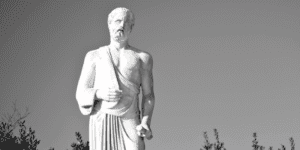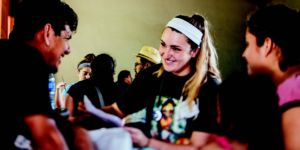
Disciple Making Medicine
We just need someone to help us find our way,” the patient’s wife pleaded as she sat at the head of the table in our procedure room nearly four years ago. She was facing away from the surgical field where I was working meticulously on her husband to suture the vas deferens together using microsurgery under the Zeiss surgical microscope hanging above the table.
“We just need someone to help us find our way,” the patient’s wife pleaded as she sat at the head of the table in our procedure room nearly four years ago. She was facing away from the surgical field where I was working meticulously on her husband to suture the vas deferens together using microsurgery under the Zeiss surgical microscope hanging above the table. I was struck by the wife’s unusual statement, as she had said the same thing at least once before during our conversation.
My patient and his wife had traveled halfway around the country from the East Coast to The Reversal Clinic in Oklahoma because they were certain they should have another child after his vasectomy. After reading descriptions in chat groups and blogs, as well as some testimonies on the website about the spiritual side of the practice, they scheduled an appointment online and flew out to Oklahoma.
They gladly agreed to the offer to pray after the preoperative discussion. While the husband and I prepared for the procedure, he shared how he was reading through the Bible and had finished the first few books. I later learned they had explored some other religions without finding hope or peace before he began reading the Scriptures in earnest a few months before.
w months before. Because the vasectomy reversal surgery is conducted under local anesthesia, we were able to converse throughout the procedure and he enthusiastically peppered me with question after question, mainly centered on Bible passages. It was obvious he was searching for the truth, since he had well-developed questions about meaning and details. I responded with the Scriptures, always looking for the opportunity to describe the beauty of our Savior and His ability to forgive sin. I told them both that the way to God is a Person and pointed them to the One who died for their sin at the cross and rose again, the One who is mighty to save.
The time in surgery passed very quickly. After the post-operative discussion, I gave them a variety of resources to take home, as well as offered to introduce them to a friend of mine in the Northeast who could connect them with other believers for Bible study. They were very excited about that possibility and asked me to share their contact information with my friend. They left the office hopeful for a new life.
Fast-forward a few weeks, and I called to check on how things were going. My patient told me how they had started a study with a believer and together they had been reading weekly in Genesis, but it wasn’t long before that fell apart for a variety of reasons. When I heard the study had ended, I sent up a quick prayer and asked him if he wanted to study weekly by Skype or phone call.
To my surprise, he responded, “Yes, that would be great!” I had studied the Scriptures with a number of patients and their families over the years, but never “long distance.” Over the next few months, both my patient and his wife received Christ. And during one of our study sessions, I heard the great news that they were expecting. We asked many of our friends to pray because her last two children had been premature (both children did well after long battles in the PICU). Nine months later, the Lord granted them a full-term, healthy daughter. Soon after accepting Christ, the couple led their three older children to the Lord. They have joy and increasing peace in the home, and now they are sharing Christ with their friends and extended family.
Our experience with this family broadened my understanding of what the Lord can do in the lives of the patients who travel to my practice. And I pondered this again after reading David Watson and Paul Watson’s book Contagious Disciple Making, in which they describe a biblical strategy for disciple-making that I now apply to our practice ministry.
My daughter gave the book to me after hearing a missionary friend recommend it while speaking at a seminar. He described the disciple-making strategy in this way, “Our greatest need is for our own lives to be pleasing to the Lord and to be obedient disciples. We ask that we be led to the persons God has prepared beforehand, we call them ‘per-sons of peace.’ These people are open, hungry and willing to share with their family and friends. Our next ‘goal’ is to invite them to begin a ‘discovery group’ and encourage them to invite their family or friends. We pray that they will come to know God as they read, beginning with creation and moving on through to the life of the Lord Jesus. It is a slow process, that challenges our faith and keeps us praying and believing that the Holy Spirit is working in their lives.”
Other experienced disciple makers observe that the person of peace (Luke 10:1-9) will sometimes come to you instead of you searching for him. This occurs when others notice a life of obvious genuine spirituality. They also point out that when the Lord Jesus spoke the Great Commission to the 11 disciples on the mountain (Matthew 28:18-20), He told them to teach their disciples to observe or obey all things He had commanded them. “All things” includes teaching them to make disciples. So, we should begin with the end in mind. This partly entails making disciples who can themselves make disciples, sometimes referred to as reproducing disciples.
As I reflected on my experience with this patient and his family, I began seeing that I was likely missing spiritual and disciple-making opportunities with patients and couples coming through the practice. I determined to intently explore what God may be doing in every patient’s life.
I started praying for every patient by name before each one’s appointment. All my patient appointments last about two and a half hours. I begin with casual, simple conversation during the appointment by, for example, asking about their trip, work or family. If they are open to casual conversation, I then move to meaningful, more serious conversation if the patient allows. These topics would include their passions, struggles, dreams, goals and purpose.
If they open the door to meaningful conversation, then I have opportunity to speak of spiritual things in a natural way. If they don’t respond to my thoughtful “spiritual snack,” then the conversation can naturally move along as it was before, with no offense taken.
A few months ago, a patient was talking about the struggles of his schedule with his wife working day shift and himself working night shift. I told him I had not gone through that exact situation, but at times during residency, I was often sleep deprived and basically did not see my wife much for stretches of time because of being on call and then sleeping the next day. The only way we made it through that difficult time was by leaning on the Lord. He did not respond to the comment or ask any questions. That was a “no thank you” to my spiritual snack, and the conversation went no further in spiritual matters. We returned to the level he was comfortable with as the appointment continued.
Through these experiences, I have learned that only God can open the doors to my patients’ hearts. As it says in John 6, “No one can come to Me unless the Father who sent Me draws Him…Everyone who has heard and learned from the Father, comes to Me” ( John 6:44-45, NASB).
Another way to gauge spiritual openness or hunger is to tell a story from the Bible or your life that manifests God, and then follow it up with a related question such as, “Do you think God is still able to guide us like that?”
If the patient does respond positively to a mention of God or His work in Scripture or my life, I usually invite them at the end of their appointment to continue the conversation by email. If they are eager to do that, then I send email content centered around a felt need expressed during their appointment or a question in their mind. Retelling of a Jesus story on voice memo attachment to the email has been effective for the Holy Spirit’s working in lives. At some point, I offer to show them how they and their family can discover God or learn what God says about life through the Scriptures.
Traditionally discovery groups are face to face, but I am using Skype or phone for weekly discovery groups with out-of-town patients. If you have multiple patient encounters of shorter length in your local practice, the relationship and conversations may develop over time and, God willing, you will be able to have the typical face-to-face discovery groups.
We have yet to see someone who received Christ through a discovery group then begin another discovery group with their friends or family, but our earnest desire is to see a second generation. Paul in 2 Timothy 2:2 describes four generations. This key level of reproducibility (four generations) is incorporated in most definitions of Disciple Making Movements (DMM), a term describing a goal for those using these disciple-making principles.
We believe prayer is one of the key components to seeing disciples come to Christ, grow in their faith and make reproducing disciples (Luke 5:16, Acts 1:14). We can do nothing without Him. We are excited about what God is doing and are developing a practice ministry plan in order to be intentional in our clinic encounters as well as our contact before and after their appointments. We would be delighted if the disciple-making needs outside the practice become too great for the physicians. In that event, we will need wisdom as we consider hiring a chaplain or other possibilities for help outside the practice.
Do you have a practice ministry plan? Or have you seen the Lord work in similar ways in your practice with your patients and their families? Healthcare provides us countless opportunities for ministry, particularly in making and reproducing disciples. If you haven’t already, I encourage you to start bringing this important aspect of ministry to your practice. And I pray you will have the joy of seeing some of your patients and their families make disciples as our Lord commanded.
DAVID AND FRAN WILSON live on a farm near Fort Gibson, Oklahoma. They have four grown children (two married to amazing spouses) and one very happy 2-year-old grandson. They have considered themselves missionaries to Oklahoma since moving to the area 23 years ago. A simple church meets in their home. David had to close his 10-year-old general surgery solo practice in 2005 after the decision to stop provider agreements with all private insurance and government payers due to his conscience regarding receiving payment from entities who provide compensation for elective abortion. The Lord redirected him to vasectomy reversal surgery, and the Reversal Clinic was established which, by God’s grace, is becoming a medical access ministry to make disciples who can make disciples who can make disciples. For more information or to be added to the clinic’s prayer up-date list, please contact [email protected].
This Feature Story Appears in:
Other Recent CMDA Today Articles:
- « Previous
- 1
- …
- 3
- 4
- 5




